BBM204 Business Law Assignment: Negligence, Contract and Offers
VerifiedAdded on 2022/08/10
|14
|3924
|346
Homework Assignment
AI Summary
This assignment delves into key areas of business law, addressing professional negligence, contract law principles, and the revocation of offers. It begins by defining professional negligence and then outlines the essential elements required to establish it, including duty of care, breach of duty, causation, and damages. The assignment uses case examples to illustrate these elements. The second part of the assignment focuses on contract law, defining the essential elements of a valid contract, and differentiating between conditions and warranties within a contract. The final section explores the concept of offer revocation, detailing the ways in which an offer can be terminated and the relevant legal principles, also supported by case law. The assignment provides a comprehensive overview of these core legal concepts within a business context.
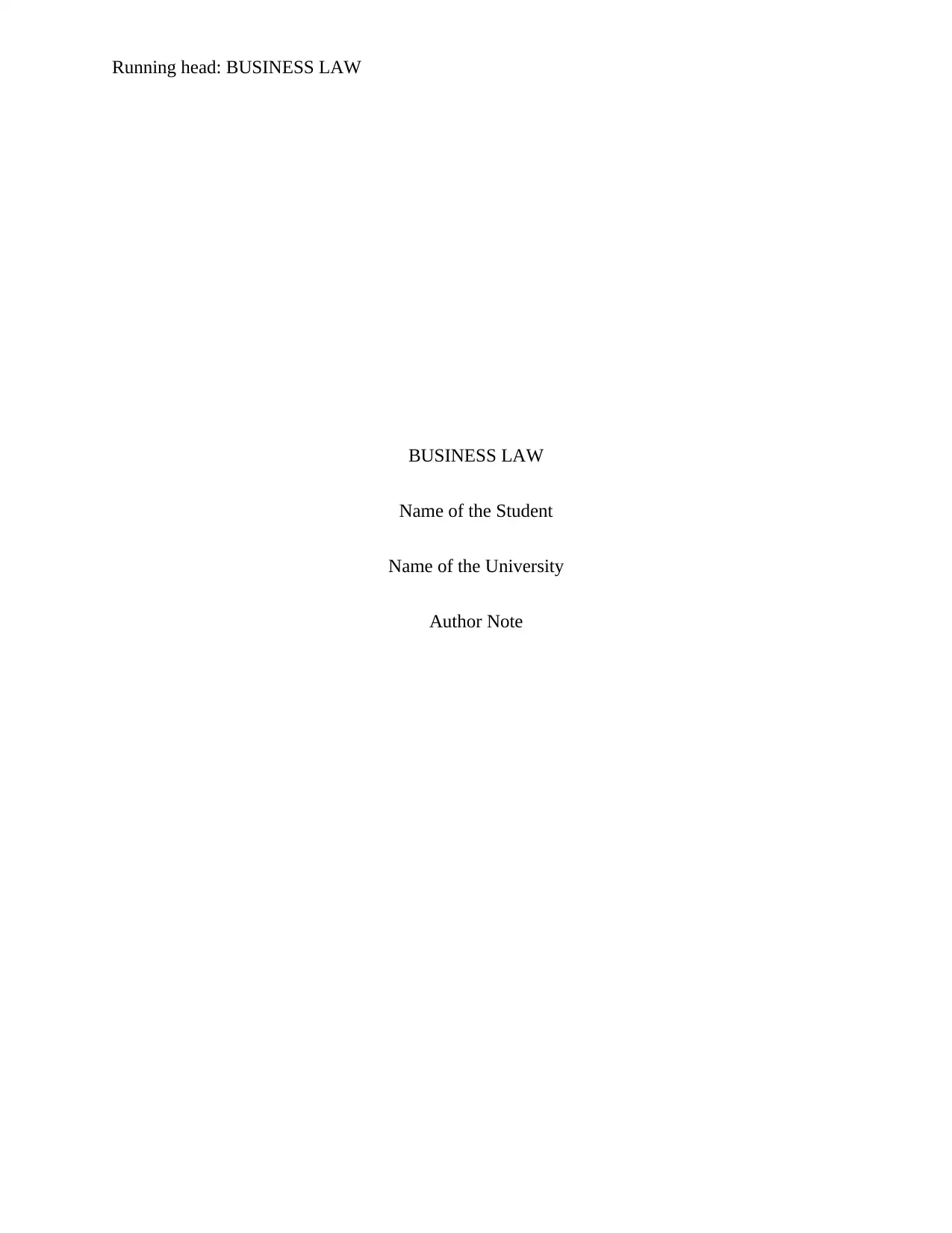
Running head: BUSINESS LAW
BUSINESS LAW
Name of the Student
Name of the University
Author Note
BUSINESS LAW
Name of the Student
Name of the University
Author Note
Paraphrase This Document
Need a fresh take? Get an instant paraphrase of this document with our AI Paraphraser
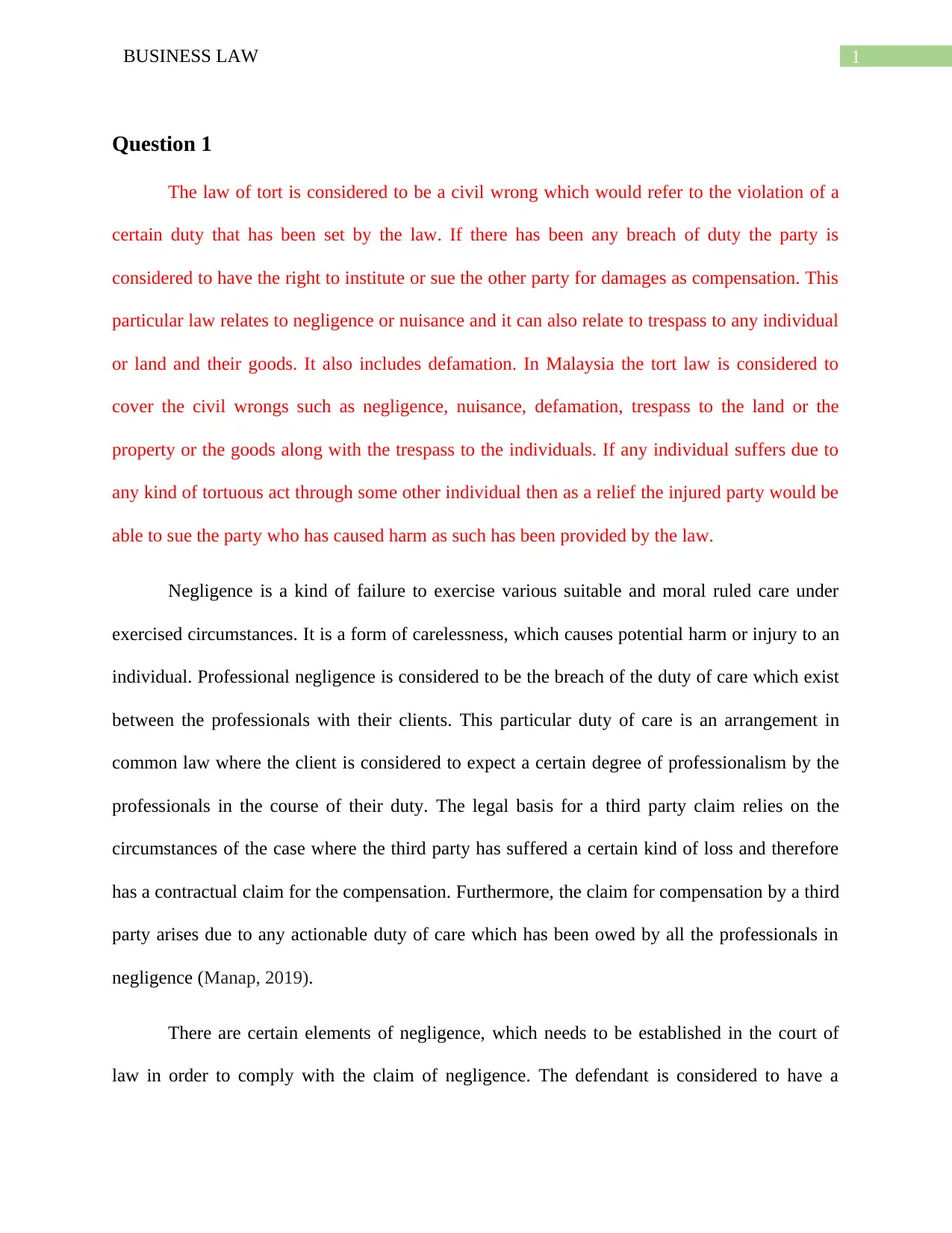
1BUSINESS LAW
Question 1
The law of tort is considered to be a civil wrong which would refer to the violation of a
certain duty that has been set by the law. If there has been any breach of duty the party is
considered to have the right to institute or sue the other party for damages as compensation. This
particular law relates to negligence or nuisance and it can also relate to trespass to any individual
or land and their goods. It also includes defamation. In Malaysia the tort law is considered to
cover the civil wrongs such as negligence, nuisance, defamation, trespass to the land or the
property or the goods along with the trespass to the individuals. If any individual suffers due to
any kind of tortuous act through some other individual then as a relief the injured party would be
able to sue the party who has caused harm as such has been provided by the law.
Negligence is a kind of failure to exercise various suitable and moral ruled care under
exercised circumstances. It is a form of carelessness, which causes potential harm or injury to an
individual. Professional negligence is considered to be the breach of the duty of care which exist
between the professionals with their clients. This particular duty of care is an arrangement in
common law where the client is considered to expect a certain degree of professionalism by the
professionals in the course of their duty. The legal basis for a third party claim relies on the
circumstances of the case where the third party has suffered a certain kind of loss and therefore
has a contractual claim for the compensation. Furthermore, the claim for compensation by a third
party arises due to any actionable duty of care which has been owed by all the professionals in
negligence (Manap, 2019).
There are certain elements of negligence, which needs to be established in the court of
law in order to comply with the claim of negligence. The defendant is considered to have a
Question 1
The law of tort is considered to be a civil wrong which would refer to the violation of a
certain duty that has been set by the law. If there has been any breach of duty the party is
considered to have the right to institute or sue the other party for damages as compensation. This
particular law relates to negligence or nuisance and it can also relate to trespass to any individual
or land and their goods. It also includes defamation. In Malaysia the tort law is considered to
cover the civil wrongs such as negligence, nuisance, defamation, trespass to the land or the
property or the goods along with the trespass to the individuals. If any individual suffers due to
any kind of tortuous act through some other individual then as a relief the injured party would be
able to sue the party who has caused harm as such has been provided by the law.
Negligence is a kind of failure to exercise various suitable and moral ruled care under
exercised circumstances. It is a form of carelessness, which causes potential harm or injury to an
individual. Professional negligence is considered to be the breach of the duty of care which exist
between the professionals with their clients. This particular duty of care is an arrangement in
common law where the client is considered to expect a certain degree of professionalism by the
professionals in the course of their duty. The legal basis for a third party claim relies on the
circumstances of the case where the third party has suffered a certain kind of loss and therefore
has a contractual claim for the compensation. Furthermore, the claim for compensation by a third
party arises due to any actionable duty of care which has been owed by all the professionals in
negligence (Manap, 2019).
There are certain elements of negligence, which needs to be established in the court of
law in order to comply with the claim of negligence. The defendant is considered to have a
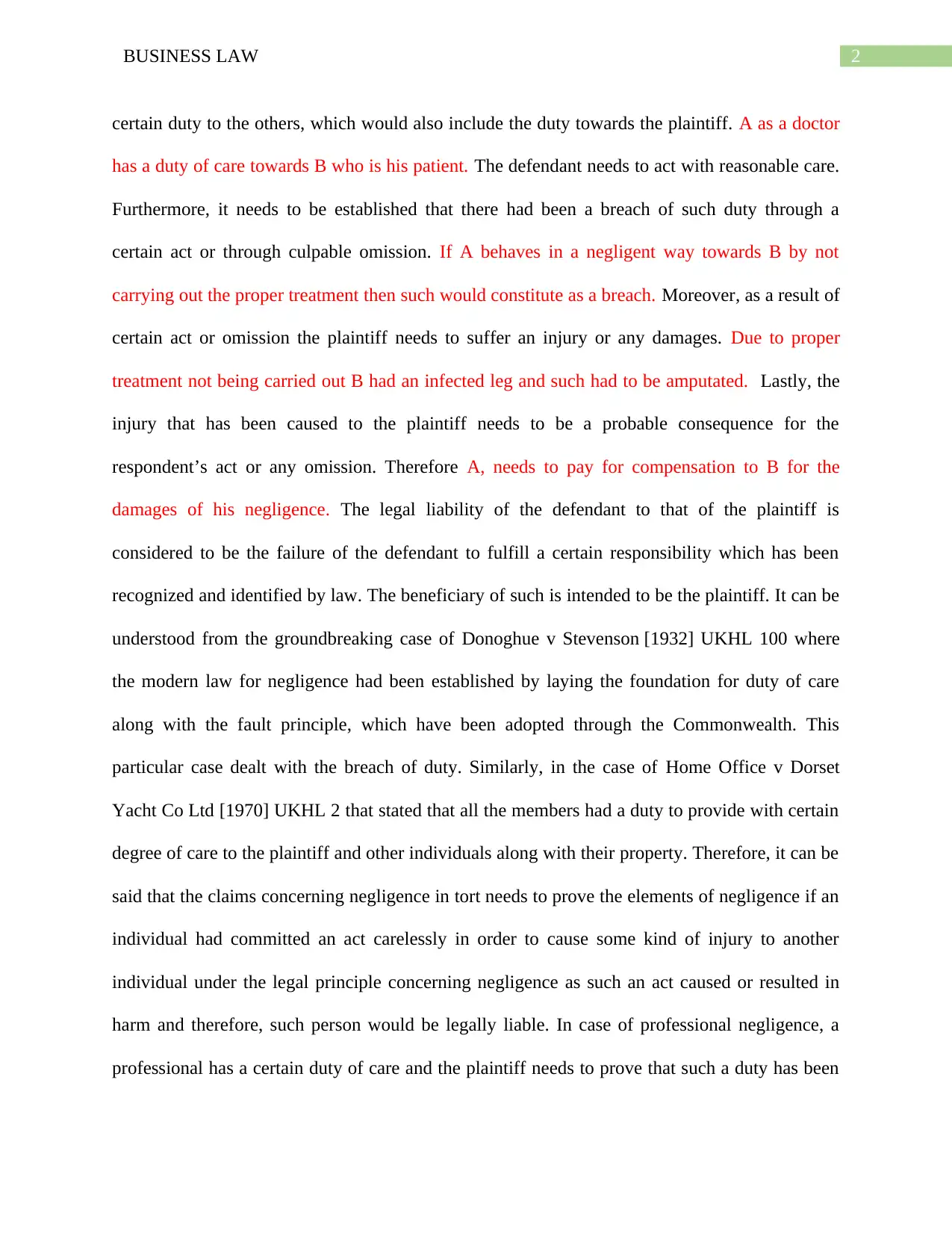
2BUSINESS LAW
certain duty to the others, which would also include the duty towards the plaintiff. A as a doctor
has a duty of care towards B who is his patient. The defendant needs to act with reasonable care.
Furthermore, it needs to be established that there had been a breach of such duty through a
certain act or through culpable omission. If A behaves in a negligent way towards B by not
carrying out the proper treatment then such would constitute as a breach. Moreover, as a result of
certain act or omission the plaintiff needs to suffer an injury or any damages. Due to proper
treatment not being carried out B had an infected leg and such had to be amputated. Lastly, the
injury that has been caused to the plaintiff needs to be a probable consequence for the
respondent’s act or any omission. Therefore A, needs to pay for compensation to B for the
damages of his negligence. The legal liability of the defendant to that of the plaintiff is
considered to be the failure of the defendant to fulfill a certain responsibility which has been
recognized and identified by law. The beneficiary of such is intended to be the plaintiff. It can be
understood from the groundbreaking case of Donoghue v Stevenson [1932] UKHL 100 where
the modern law for negligence had been established by laying the foundation for duty of care
along with the fault principle, which have been adopted through the Commonwealth. This
particular case dealt with the breach of duty. Similarly, in the case of Home Office v Dorset
Yacht Co Ltd [1970] UKHL 2 that stated that all the members had a duty to provide with certain
degree of care to the plaintiff and other individuals along with their property. Therefore, it can be
said that the claims concerning negligence in tort needs to prove the elements of negligence if an
individual had committed an act carelessly in order to cause some kind of injury to another
individual under the legal principle concerning negligence as such an act caused or resulted in
harm and therefore, such person would be legally liable. In case of professional negligence, a
professional has a certain duty of care and the plaintiff needs to prove that such a duty has been
certain duty to the others, which would also include the duty towards the plaintiff. A as a doctor
has a duty of care towards B who is his patient. The defendant needs to act with reasonable care.
Furthermore, it needs to be established that there had been a breach of such duty through a
certain act or through culpable omission. If A behaves in a negligent way towards B by not
carrying out the proper treatment then such would constitute as a breach. Moreover, as a result of
certain act or omission the plaintiff needs to suffer an injury or any damages. Due to proper
treatment not being carried out B had an infected leg and such had to be amputated. Lastly, the
injury that has been caused to the plaintiff needs to be a probable consequence for the
respondent’s act or any omission. Therefore A, needs to pay for compensation to B for the
damages of his negligence. The legal liability of the defendant to that of the plaintiff is
considered to be the failure of the defendant to fulfill a certain responsibility which has been
recognized and identified by law. The beneficiary of such is intended to be the plaintiff. It can be
understood from the groundbreaking case of Donoghue v Stevenson [1932] UKHL 100 where
the modern law for negligence had been established by laying the foundation for duty of care
along with the fault principle, which have been adopted through the Commonwealth. This
particular case dealt with the breach of duty. Similarly, in the case of Home Office v Dorset
Yacht Co Ltd [1970] UKHL 2 that stated that all the members had a duty to provide with certain
degree of care to the plaintiff and other individuals along with their property. Therefore, it can be
said that the claims concerning negligence in tort needs to prove the elements of negligence if an
individual had committed an act carelessly in order to cause some kind of injury to another
individual under the legal principle concerning negligence as such an act caused or resulted in
harm and therefore, such person would be legally liable. In case of professional negligence, a
professional has a certain duty of care and the plaintiff needs to prove that such a duty has been
⊘ This is a preview!⊘
Do you want full access?
Subscribe today to unlock all pages.

Trusted by 1+ million students worldwide
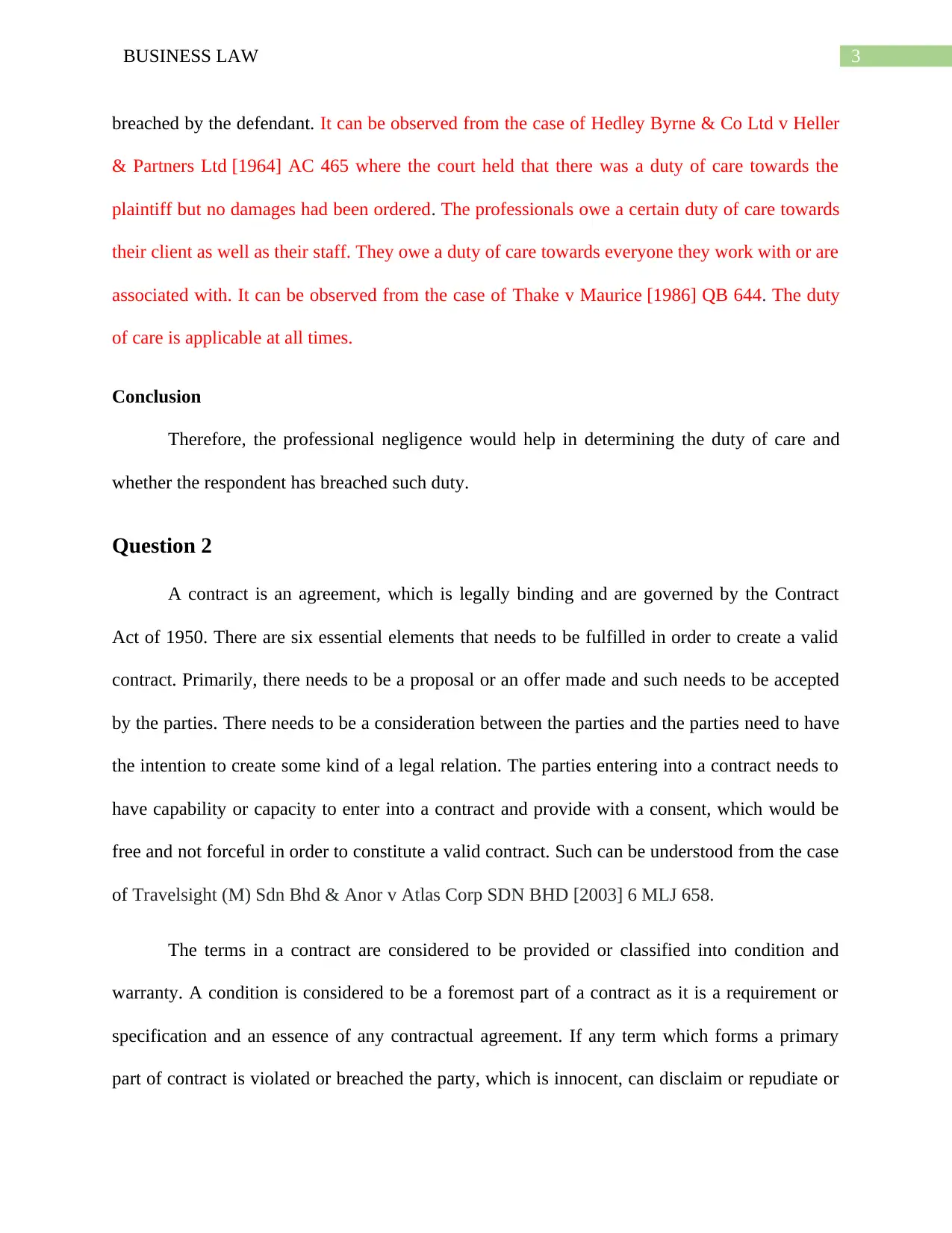
3BUSINESS LAW
breached by the defendant. It can be observed from the case of Hedley Byrne & Co Ltd v Heller
& Partners Ltd [1964] AC 465 where the court held that there was a duty of care towards the
plaintiff but no damages had been ordered. The professionals owe a certain duty of care towards
their client as well as their staff. They owe a duty of care towards everyone they work with or are
associated with. It can be observed from the case of Thake v Maurice [1986] QB 644. The duty
of care is applicable at all times.
Conclusion
Therefore, the professional negligence would help in determining the duty of care and
whether the respondent has breached such duty.
Question 2
A contract is an agreement, which is legally binding and are governed by the Contract
Act of 1950. There are six essential elements that needs to be fulfilled in order to create a valid
contract. Primarily, there needs to be a proposal or an offer made and such needs to be accepted
by the parties. There needs to be a consideration between the parties and the parties need to have
the intention to create some kind of a legal relation. The parties entering into a contract needs to
have capability or capacity to enter into a contract and provide with a consent, which would be
free and not forceful in order to constitute a valid contract. Such can be understood from the case
of Travelsight (M) Sdn Bhd & Anor v Atlas Corp SDN BHD [2003] 6 MLJ 658.
The terms in a contract are considered to be provided or classified into condition and
warranty. A condition is considered to be a foremost part of a contract as it is a requirement or
specification and an essence of any contractual agreement. If any term which forms a primary
part of contract is violated or breached the party, which is innocent, can disclaim or repudiate or
breached by the defendant. It can be observed from the case of Hedley Byrne & Co Ltd v Heller
& Partners Ltd [1964] AC 465 where the court held that there was a duty of care towards the
plaintiff but no damages had been ordered. The professionals owe a certain duty of care towards
their client as well as their staff. They owe a duty of care towards everyone they work with or are
associated with. It can be observed from the case of Thake v Maurice [1986] QB 644. The duty
of care is applicable at all times.
Conclusion
Therefore, the professional negligence would help in determining the duty of care and
whether the respondent has breached such duty.
Question 2
A contract is an agreement, which is legally binding and are governed by the Contract
Act of 1950. There are six essential elements that needs to be fulfilled in order to create a valid
contract. Primarily, there needs to be a proposal or an offer made and such needs to be accepted
by the parties. There needs to be a consideration between the parties and the parties need to have
the intention to create some kind of a legal relation. The parties entering into a contract needs to
have capability or capacity to enter into a contract and provide with a consent, which would be
free and not forceful in order to constitute a valid contract. Such can be understood from the case
of Travelsight (M) Sdn Bhd & Anor v Atlas Corp SDN BHD [2003] 6 MLJ 658.
The terms in a contract are considered to be provided or classified into condition and
warranty. A condition is considered to be a foremost part of a contract as it is a requirement or
specification and an essence of any contractual agreement. If any term which forms a primary
part of contract is violated or breached the party, which is innocent, can disclaim or repudiate or
Paraphrase This Document
Need a fresh take? Get an instant paraphrase of this document with our AI Paraphraser
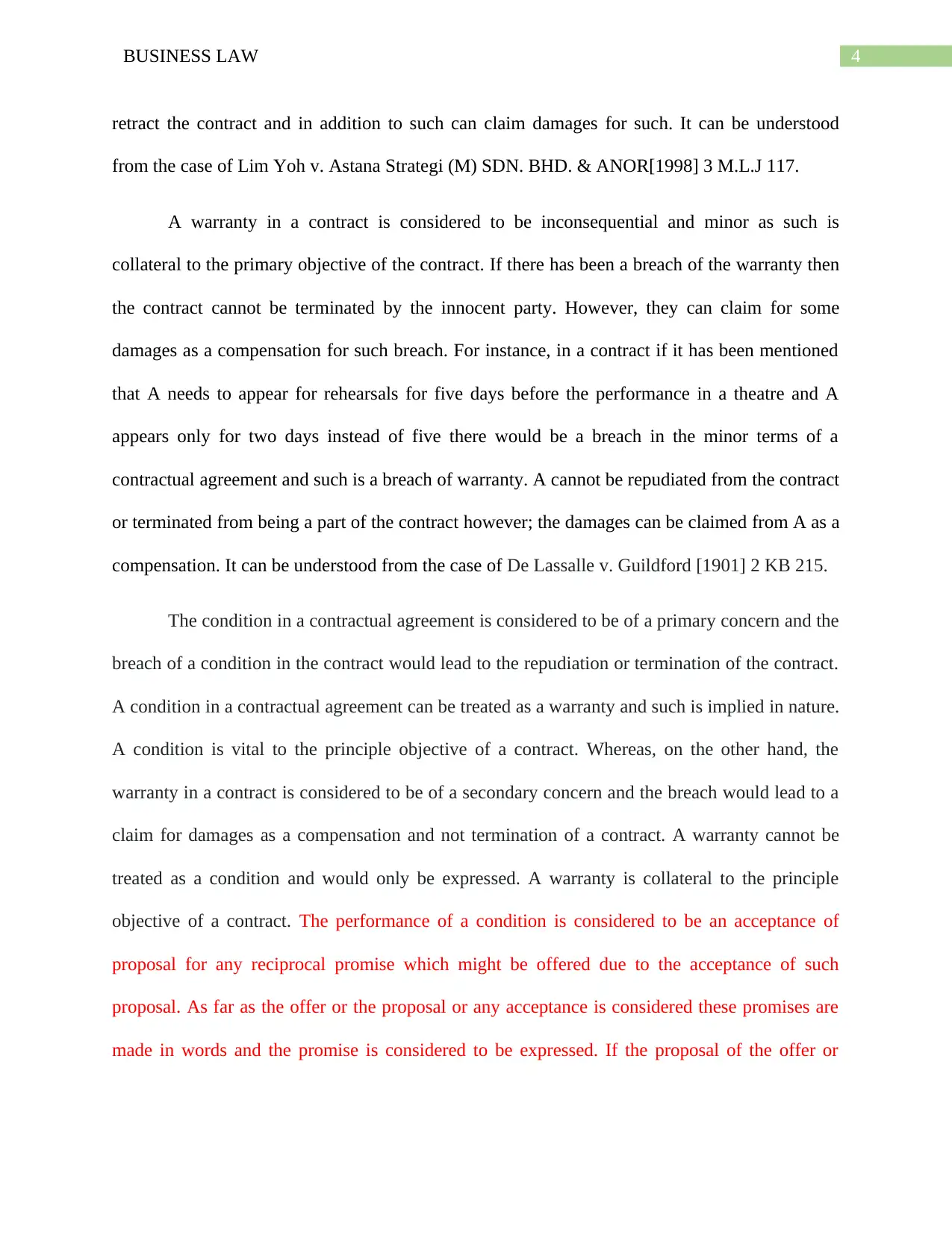
4BUSINESS LAW
retract the contract and in addition to such can claim damages for such. It can be understood
from the case of Lim Yoh v. Astana Strategi (M) SDN. BHD. & ANOR[1998] 3 M.L.J 117.
A warranty in a contract is considered to be inconsequential and minor as such is
collateral to the primary objective of the contract. If there has been a breach of the warranty then
the contract cannot be terminated by the innocent party. However, they can claim for some
damages as a compensation for such breach. For instance, in a contract if it has been mentioned
that A needs to appear for rehearsals for five days before the performance in a theatre and A
appears only for two days instead of five there would be a breach in the minor terms of a
contractual agreement and such is a breach of warranty. A cannot be repudiated from the contract
or terminated from being a part of the contract however; the damages can be claimed from A as a
compensation. It can be understood from the case of De Lassalle v. Guildford [1901] 2 KB 215.
The condition in a contractual agreement is considered to be of a primary concern and the
breach of a condition in the contract would lead to the repudiation or termination of the contract.
A condition in a contractual agreement can be treated as a warranty and such is implied in nature.
A condition is vital to the principle objective of a contract. Whereas, on the other hand, the
warranty in a contract is considered to be of a secondary concern and the breach would lead to a
claim for damages as a compensation and not termination of a contract. A warranty cannot be
treated as a condition and would only be expressed. A warranty is collateral to the principle
objective of a contract. The performance of a condition is considered to be an acceptance of
proposal for any reciprocal promise which might be offered due to the acceptance of such
proposal. As far as the offer or the proposal or any acceptance is considered these promises are
made in words and the promise is considered to be expressed. If the proposal of the offer or
retract the contract and in addition to such can claim damages for such. It can be understood
from the case of Lim Yoh v. Astana Strategi (M) SDN. BHD. & ANOR[1998] 3 M.L.J 117.
A warranty in a contract is considered to be inconsequential and minor as such is
collateral to the primary objective of the contract. If there has been a breach of the warranty then
the contract cannot be terminated by the innocent party. However, they can claim for some
damages as a compensation for such breach. For instance, in a contract if it has been mentioned
that A needs to appear for rehearsals for five days before the performance in a theatre and A
appears only for two days instead of five there would be a breach in the minor terms of a
contractual agreement and such is a breach of warranty. A cannot be repudiated from the contract
or terminated from being a part of the contract however; the damages can be claimed from A as a
compensation. It can be understood from the case of De Lassalle v. Guildford [1901] 2 KB 215.
The condition in a contractual agreement is considered to be of a primary concern and the
breach of a condition in the contract would lead to the repudiation or termination of the contract.
A condition in a contractual agreement can be treated as a warranty and such is implied in nature.
A condition is vital to the principle objective of a contract. Whereas, on the other hand, the
warranty in a contract is considered to be of a secondary concern and the breach would lead to a
claim for damages as a compensation and not termination of a contract. A warranty cannot be
treated as a condition and would only be expressed. A warranty is collateral to the principle
objective of a contract. The performance of a condition is considered to be an acceptance of
proposal for any reciprocal promise which might be offered due to the acceptance of such
proposal. As far as the offer or the proposal or any acceptance is considered these promises are
made in words and the promise is considered to be expressed. If the proposal of the offer or
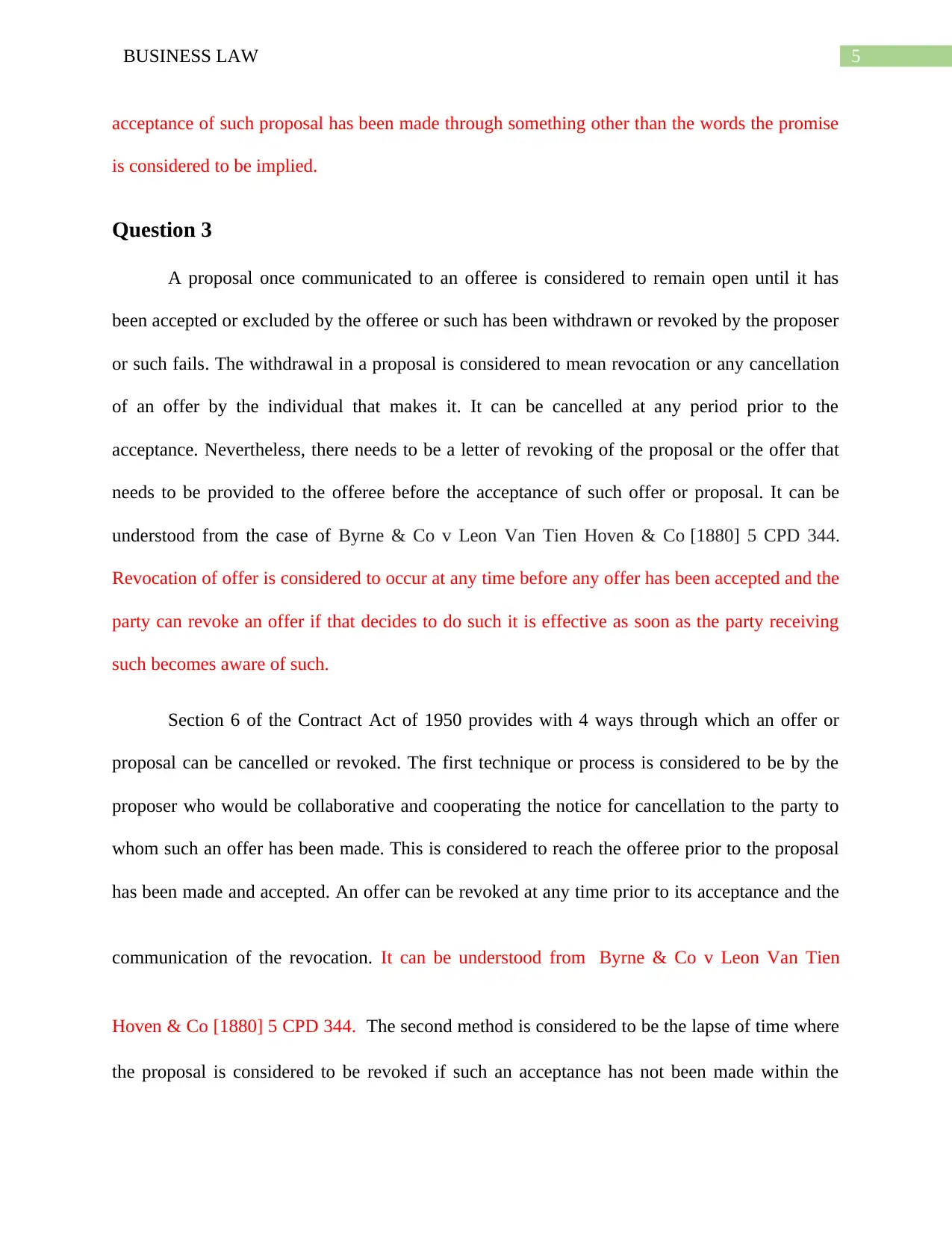
5BUSINESS LAW
acceptance of such proposal has been made through something other than the words the promise
is considered to be implied.
Question 3
A proposal once communicated to an offeree is considered to remain open until it has
been accepted or excluded by the offeree or such has been withdrawn or revoked by the proposer
or such fails. The withdrawal in a proposal is considered to mean revocation or any cancellation
of an offer by the individual that makes it. It can be cancelled at any period prior to the
acceptance. Nevertheless, there needs to be a letter of revoking of the proposal or the offer that
needs to be provided to the offeree before the acceptance of such offer or proposal. It can be
understood from the case of Byrne & Co v Leon Van Tien Hoven & Co [1880] 5 CPD 344.
Revocation of offer is considered to occur at any time before any offer has been accepted and the
party can revoke an offer if that decides to do such it is effective as soon as the party receiving
such becomes aware of such.
Section 6 of the Contract Act of 1950 provides with 4 ways through which an offer or
proposal can be cancelled or revoked. The first technique or process is considered to be by the
proposer who would be collaborative and cooperating the notice for cancellation to the party to
whom such an offer has been made. This is considered to reach the offeree prior to the proposal
has been made and accepted. An offer can be revoked at any time prior to its acceptance and the
communication of the revocation. It can be understood from Byrne & Co v Leon Van Tien
Hoven & Co [1880] 5 CPD 344. The second method is considered to be the lapse of time where
the proposal is considered to be revoked if such an acceptance has not been made within the
acceptance of such proposal has been made through something other than the words the promise
is considered to be implied.
Question 3
A proposal once communicated to an offeree is considered to remain open until it has
been accepted or excluded by the offeree or such has been withdrawn or revoked by the proposer
or such fails. The withdrawal in a proposal is considered to mean revocation or any cancellation
of an offer by the individual that makes it. It can be cancelled at any period prior to the
acceptance. Nevertheless, there needs to be a letter of revoking of the proposal or the offer that
needs to be provided to the offeree before the acceptance of such offer or proposal. It can be
understood from the case of Byrne & Co v Leon Van Tien Hoven & Co [1880] 5 CPD 344.
Revocation of offer is considered to occur at any time before any offer has been accepted and the
party can revoke an offer if that decides to do such it is effective as soon as the party receiving
such becomes aware of such.
Section 6 of the Contract Act of 1950 provides with 4 ways through which an offer or
proposal can be cancelled or revoked. The first technique or process is considered to be by the
proposer who would be collaborative and cooperating the notice for cancellation to the party to
whom such an offer has been made. This is considered to reach the offeree prior to the proposal
has been made and accepted. An offer can be revoked at any time prior to its acceptance and the
communication of the revocation. It can be understood from Byrne & Co v Leon Van Tien
Hoven & Co [1880] 5 CPD 344. The second method is considered to be the lapse of time where
the proposal is considered to be revoked if such an acceptance has not been made within the
⊘ This is a preview!⊘
Do you want full access?
Subscribe today to unlock all pages.

Trusted by 1+ million students worldwide
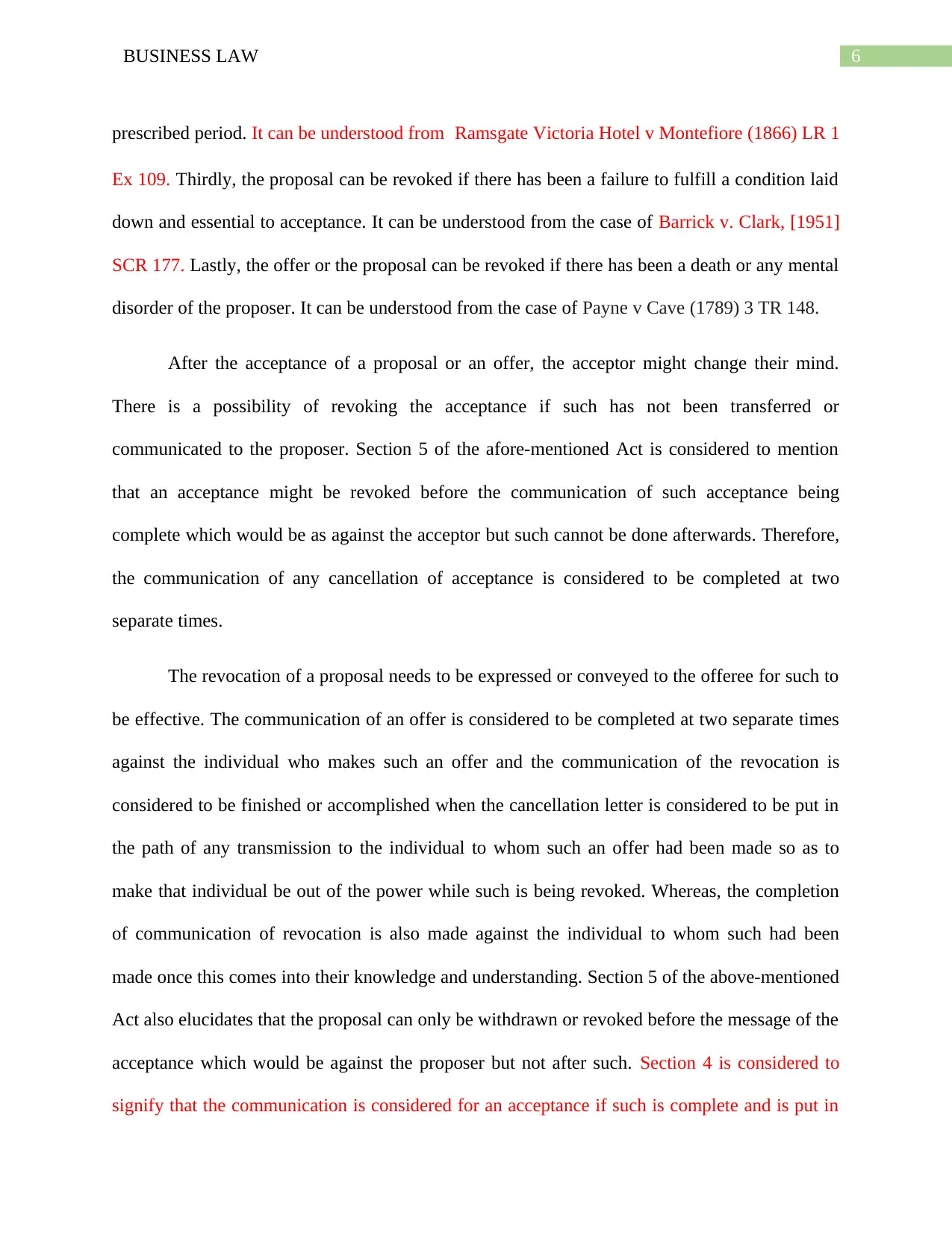
6BUSINESS LAW
prescribed period. It can be understood from Ramsgate Victoria Hotel v Montefiore (1866) LR 1
Ex 109. Thirdly, the proposal can be revoked if there has been a failure to fulfill a condition laid
down and essential to acceptance. It can be understood from the case of Barrick v. Clark, [1951]
SCR 177. Lastly, the offer or the proposal can be revoked if there has been a death or any mental
disorder of the proposer. It can be understood from the case of Payne v Cave (1789) 3 TR 148.
After the acceptance of a proposal or an offer, the acceptor might change their mind.
There is a possibility of revoking the acceptance if such has not been transferred or
communicated to the proposer. Section 5 of the afore-mentioned Act is considered to mention
that an acceptance might be revoked before the communication of such acceptance being
complete which would be as against the acceptor but such cannot be done afterwards. Therefore,
the communication of any cancellation of acceptance is considered to be completed at two
separate times.
The revocation of a proposal needs to be expressed or conveyed to the offeree for such to
be effective. The communication of an offer is considered to be completed at two separate times
against the individual who makes such an offer and the communication of the revocation is
considered to be finished or accomplished when the cancellation letter is considered to be put in
the path of any transmission to the individual to whom such an offer had been made so as to
make that individual be out of the power while such is being revoked. Whereas, the completion
of communication of revocation is also made against the individual to whom such had been
made once this comes into their knowledge and understanding. Section 5 of the above-mentioned
Act also elucidates that the proposal can only be withdrawn or revoked before the message of the
acceptance which would be against the proposer but not after such. Section 4 is considered to
signify that the communication is considered for an acceptance if such is complete and is put in
prescribed period. It can be understood from Ramsgate Victoria Hotel v Montefiore (1866) LR 1
Ex 109. Thirdly, the proposal can be revoked if there has been a failure to fulfill a condition laid
down and essential to acceptance. It can be understood from the case of Barrick v. Clark, [1951]
SCR 177. Lastly, the offer or the proposal can be revoked if there has been a death or any mental
disorder of the proposer. It can be understood from the case of Payne v Cave (1789) 3 TR 148.
After the acceptance of a proposal or an offer, the acceptor might change their mind.
There is a possibility of revoking the acceptance if such has not been transferred or
communicated to the proposer. Section 5 of the afore-mentioned Act is considered to mention
that an acceptance might be revoked before the communication of such acceptance being
complete which would be as against the acceptor but such cannot be done afterwards. Therefore,
the communication of any cancellation of acceptance is considered to be completed at two
separate times.
The revocation of a proposal needs to be expressed or conveyed to the offeree for such to
be effective. The communication of an offer is considered to be completed at two separate times
against the individual who makes such an offer and the communication of the revocation is
considered to be finished or accomplished when the cancellation letter is considered to be put in
the path of any transmission to the individual to whom such an offer had been made so as to
make that individual be out of the power while such is being revoked. Whereas, the completion
of communication of revocation is also made against the individual to whom such had been
made once this comes into their knowledge and understanding. Section 5 of the above-mentioned
Act also elucidates that the proposal can only be withdrawn or revoked before the message of the
acceptance which would be against the proposer but not after such. Section 4 is considered to
signify that the communication is considered for an acceptance if such is complete and is put in
Paraphrase This Document
Need a fresh take? Get an instant paraphrase of this document with our AI Paraphraser
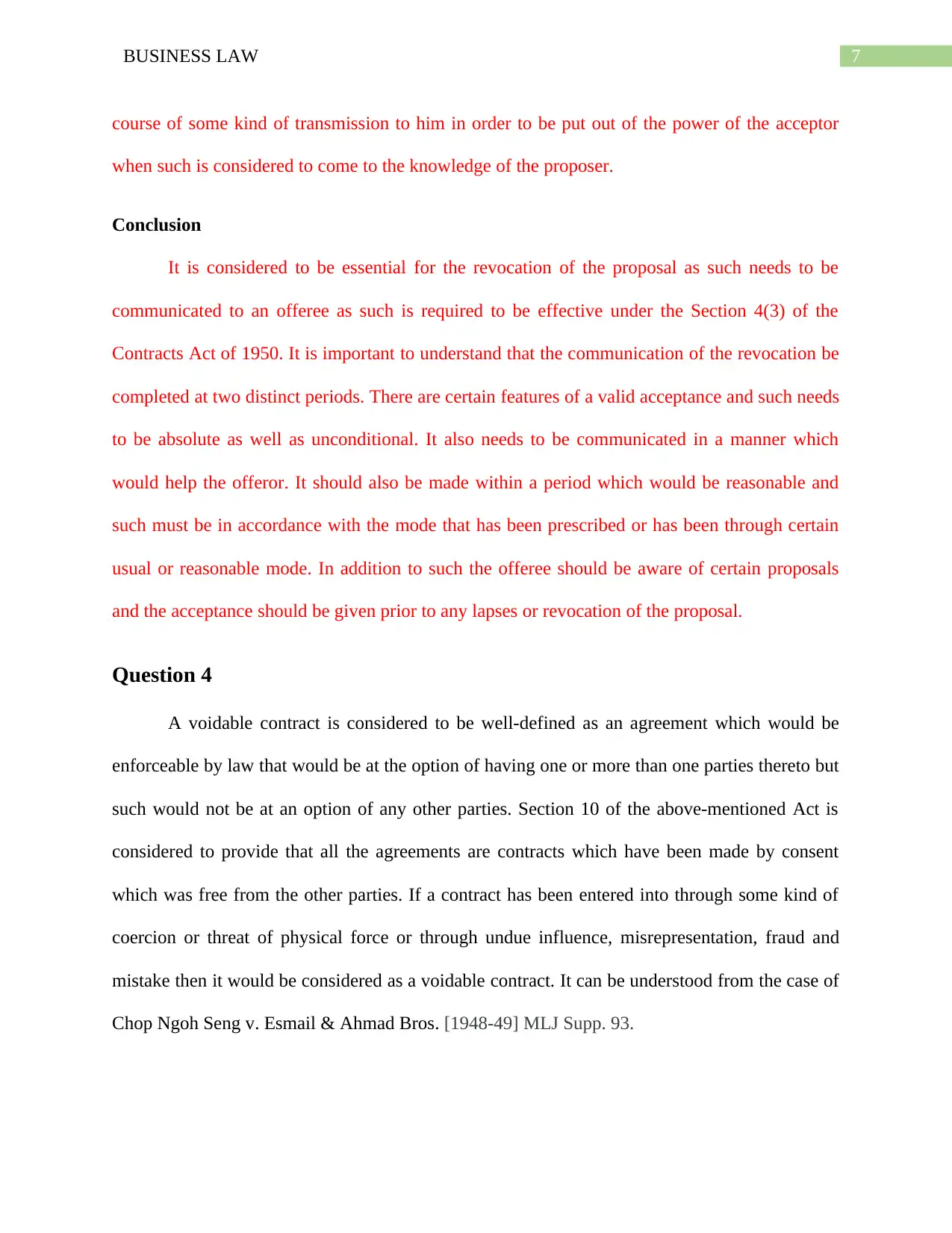
7BUSINESS LAW
course of some kind of transmission to him in order to be put out of the power of the acceptor
when such is considered to come to the knowledge of the proposer.
Conclusion
It is considered to be essential for the revocation of the proposal as such needs to be
communicated to an offeree as such is required to be effective under the Section 4(3) of the
Contracts Act of 1950. It is important to understand that the communication of the revocation be
completed at two distinct periods. There are certain features of a valid acceptance and such needs
to be absolute as well as unconditional. It also needs to be communicated in a manner which
would help the offeror. It should also be made within a period which would be reasonable and
such must be in accordance with the mode that has been prescribed or has been through certain
usual or reasonable mode. In addition to such the offeree should be aware of certain proposals
and the acceptance should be given prior to any lapses or revocation of the proposal.
Question 4
A voidable contract is considered to be well-defined as an agreement which would be
enforceable by law that would be at the option of having one or more than one parties thereto but
such would not be at an option of any other parties. Section 10 of the above-mentioned Act is
considered to provide that all the agreements are contracts which have been made by consent
which was free from the other parties. If a contract has been entered into through some kind of
coercion or threat of physical force or through undue influence, misrepresentation, fraud and
mistake then it would be considered as a voidable contract. It can be understood from the case of
Chop Ngoh Seng v. Esmail & Ahmad Bros. [1948-49] MLJ Supp. 93.
course of some kind of transmission to him in order to be put out of the power of the acceptor
when such is considered to come to the knowledge of the proposer.
Conclusion
It is considered to be essential for the revocation of the proposal as such needs to be
communicated to an offeree as such is required to be effective under the Section 4(3) of the
Contracts Act of 1950. It is important to understand that the communication of the revocation be
completed at two distinct periods. There are certain features of a valid acceptance and such needs
to be absolute as well as unconditional. It also needs to be communicated in a manner which
would help the offeror. It should also be made within a period which would be reasonable and
such must be in accordance with the mode that has been prescribed or has been through certain
usual or reasonable mode. In addition to such the offeree should be aware of certain proposals
and the acceptance should be given prior to any lapses or revocation of the proposal.
Question 4
A voidable contract is considered to be well-defined as an agreement which would be
enforceable by law that would be at the option of having one or more than one parties thereto but
such would not be at an option of any other parties. Section 10 of the above-mentioned Act is
considered to provide that all the agreements are contracts which have been made by consent
which was free from the other parties. If a contract has been entered into through some kind of
coercion or threat of physical force or through undue influence, misrepresentation, fraud and
mistake then it would be considered as a voidable contract. It can be understood from the case of
Chop Ngoh Seng v. Esmail & Ahmad Bros. [1948-49] MLJ Supp. 93.
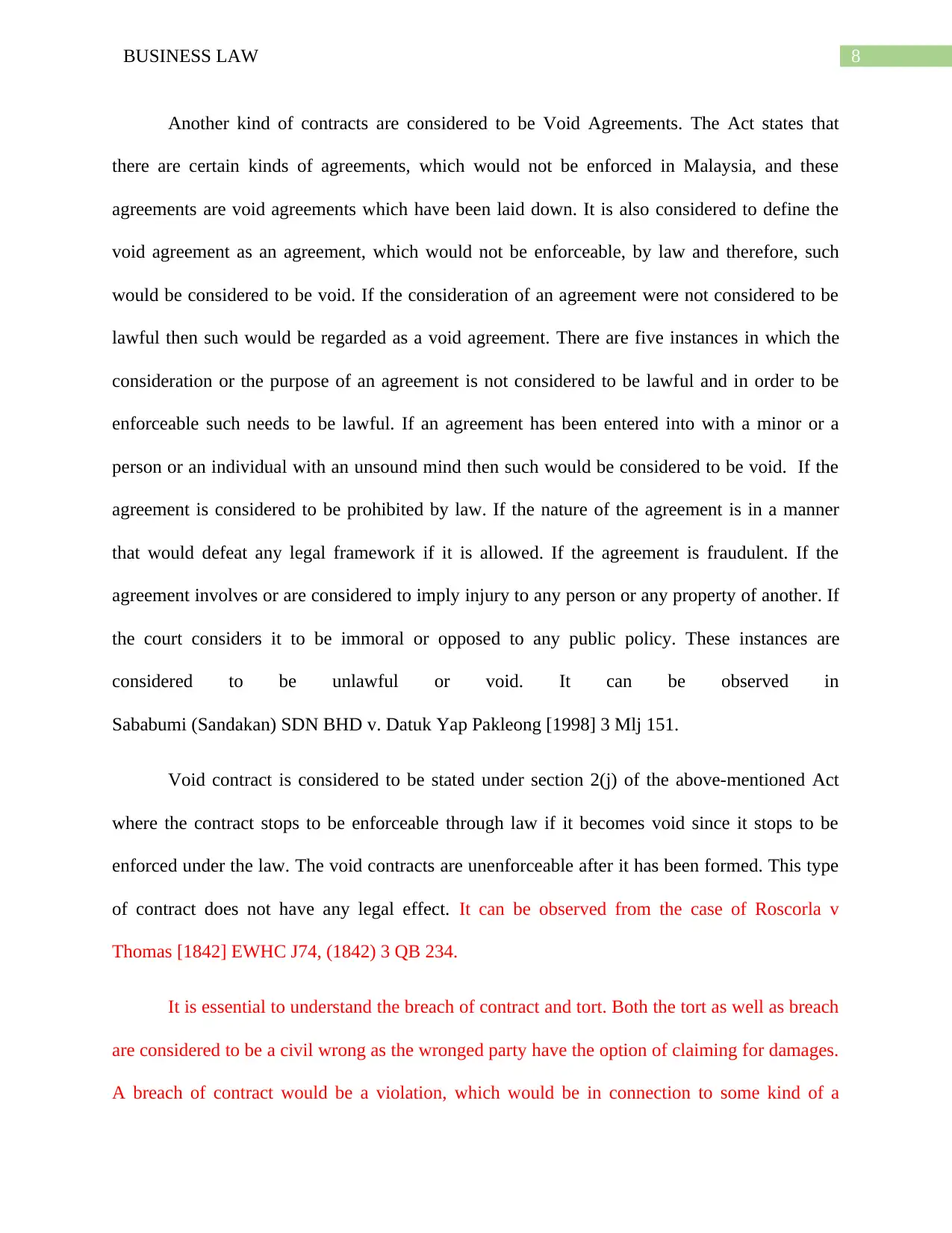
8BUSINESS LAW
Another kind of contracts are considered to be Void Agreements. The Act states that
there are certain kinds of agreements, which would not be enforced in Malaysia, and these
agreements are void agreements which have been laid down. It is also considered to define the
void agreement as an agreement, which would not be enforceable, by law and therefore, such
would be considered to be void. If the consideration of an agreement were not considered to be
lawful then such would be regarded as a void agreement. There are five instances in which the
consideration or the purpose of an agreement is not considered to be lawful and in order to be
enforceable such needs to be lawful. If an agreement has been entered into with a minor or a
person or an individual with an unsound mind then such would be considered to be void. If the
agreement is considered to be prohibited by law. If the nature of the agreement is in a manner
that would defeat any legal framework if it is allowed. If the agreement is fraudulent. If the
agreement involves or are considered to imply injury to any person or any property of another. If
the court considers it to be immoral or opposed to any public policy. These instances are
considered to be unlawful or void. It can be observed in
Sababumi (Sandakan) SDN BHD v. Datuk Yap Pakleong [1998] 3 Mlj 151.
Void contract is considered to be stated under section 2(j) of the above-mentioned Act
where the contract stops to be enforceable through law if it becomes void since it stops to be
enforced under the law. The void contracts are unenforceable after it has been formed. This type
of contract does not have any legal effect. It can be observed from the case of Roscorla v
Thomas [1842] EWHC J74, (1842) 3 QB 234.
It is essential to understand the breach of contract and tort. Both the tort as well as breach
are considered to be a civil wrong as the wronged party have the option of claiming for damages.
A breach of contract would be a violation, which would be in connection to some kind of a
Another kind of contracts are considered to be Void Agreements. The Act states that
there are certain kinds of agreements, which would not be enforced in Malaysia, and these
agreements are void agreements which have been laid down. It is also considered to define the
void agreement as an agreement, which would not be enforceable, by law and therefore, such
would be considered to be void. If the consideration of an agreement were not considered to be
lawful then such would be regarded as a void agreement. There are five instances in which the
consideration or the purpose of an agreement is not considered to be lawful and in order to be
enforceable such needs to be lawful. If an agreement has been entered into with a minor or a
person or an individual with an unsound mind then such would be considered to be void. If the
agreement is considered to be prohibited by law. If the nature of the agreement is in a manner
that would defeat any legal framework if it is allowed. If the agreement is fraudulent. If the
agreement involves or are considered to imply injury to any person or any property of another. If
the court considers it to be immoral or opposed to any public policy. These instances are
considered to be unlawful or void. It can be observed in
Sababumi (Sandakan) SDN BHD v. Datuk Yap Pakleong [1998] 3 Mlj 151.
Void contract is considered to be stated under section 2(j) of the above-mentioned Act
where the contract stops to be enforceable through law if it becomes void since it stops to be
enforced under the law. The void contracts are unenforceable after it has been formed. This type
of contract does not have any legal effect. It can be observed from the case of Roscorla v
Thomas [1842] EWHC J74, (1842) 3 QB 234.
It is essential to understand the breach of contract and tort. Both the tort as well as breach
are considered to be a civil wrong as the wronged party have the option of claiming for damages.
A breach of contract would be a violation, which would be in connection to some kind of a
⊘ This is a preview!⊘
Do you want full access?
Subscribe today to unlock all pages.

Trusted by 1+ million students worldwide
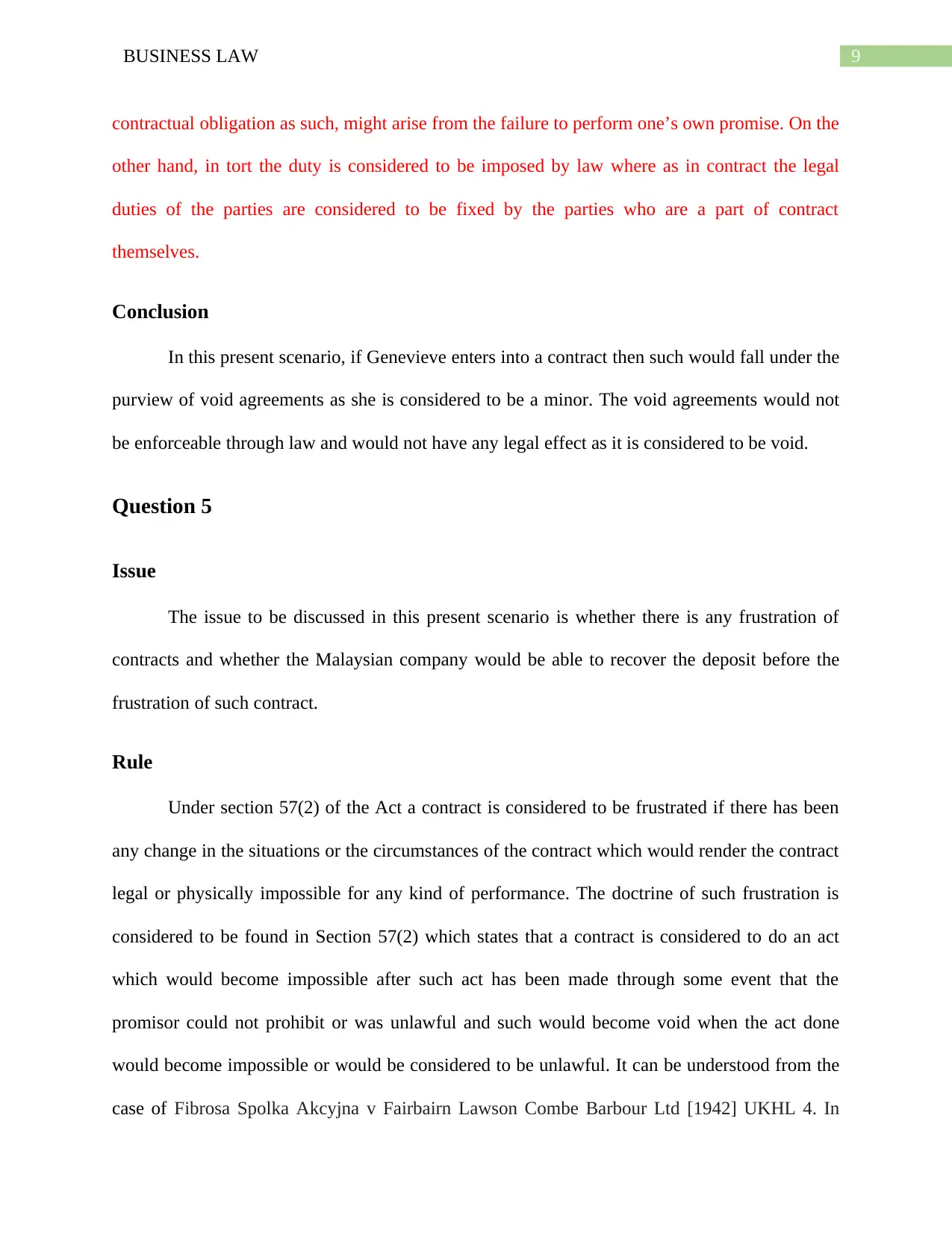
9BUSINESS LAW
contractual obligation as such, might arise from the failure to perform one’s own promise. On the
other hand, in tort the duty is considered to be imposed by law where as in contract the legal
duties of the parties are considered to be fixed by the parties who are a part of contract
themselves.
Conclusion
In this present scenario, if Genevieve enters into a contract then such would fall under the
purview of void agreements as she is considered to be a minor. The void agreements would not
be enforceable through law and would not have any legal effect as it is considered to be void.
Question 5
Issue
The issue to be discussed in this present scenario is whether there is any frustration of
contracts and whether the Malaysian company would be able to recover the deposit before the
frustration of such contract.
Rule
Under section 57(2) of the Act a contract is considered to be frustrated if there has been
any change in the situations or the circumstances of the contract which would render the contract
legal or physically impossible for any kind of performance. The doctrine of such frustration is
considered to be found in Section 57(2) which states that a contract is considered to do an act
which would become impossible after such act has been made through some event that the
promisor could not prohibit or was unlawful and such would become void when the act done
would become impossible or would be considered to be unlawful. It can be understood from the
case of Fibrosa Spolka Akcyjna v Fairbairn Lawson Combe Barbour Ltd [1942] UKHL 4. In
contractual obligation as such, might arise from the failure to perform one’s own promise. On the
other hand, in tort the duty is considered to be imposed by law where as in contract the legal
duties of the parties are considered to be fixed by the parties who are a part of contract
themselves.
Conclusion
In this present scenario, if Genevieve enters into a contract then such would fall under the
purview of void agreements as she is considered to be a minor. The void agreements would not
be enforceable through law and would not have any legal effect as it is considered to be void.
Question 5
Issue
The issue to be discussed in this present scenario is whether there is any frustration of
contracts and whether the Malaysian company would be able to recover the deposit before the
frustration of such contract.
Rule
Under section 57(2) of the Act a contract is considered to be frustrated if there has been
any change in the situations or the circumstances of the contract which would render the contract
legal or physically impossible for any kind of performance. The doctrine of such frustration is
considered to be found in Section 57(2) which states that a contract is considered to do an act
which would become impossible after such act has been made through some event that the
promisor could not prohibit or was unlawful and such would become void when the act done
would become impossible or would be considered to be unlawful. It can be understood from the
case of Fibrosa Spolka Akcyjna v Fairbairn Lawson Combe Barbour Ltd [1942] UKHL 4. In
Paraphrase This Document
Need a fresh take? Get an instant paraphrase of this document with our AI Paraphraser
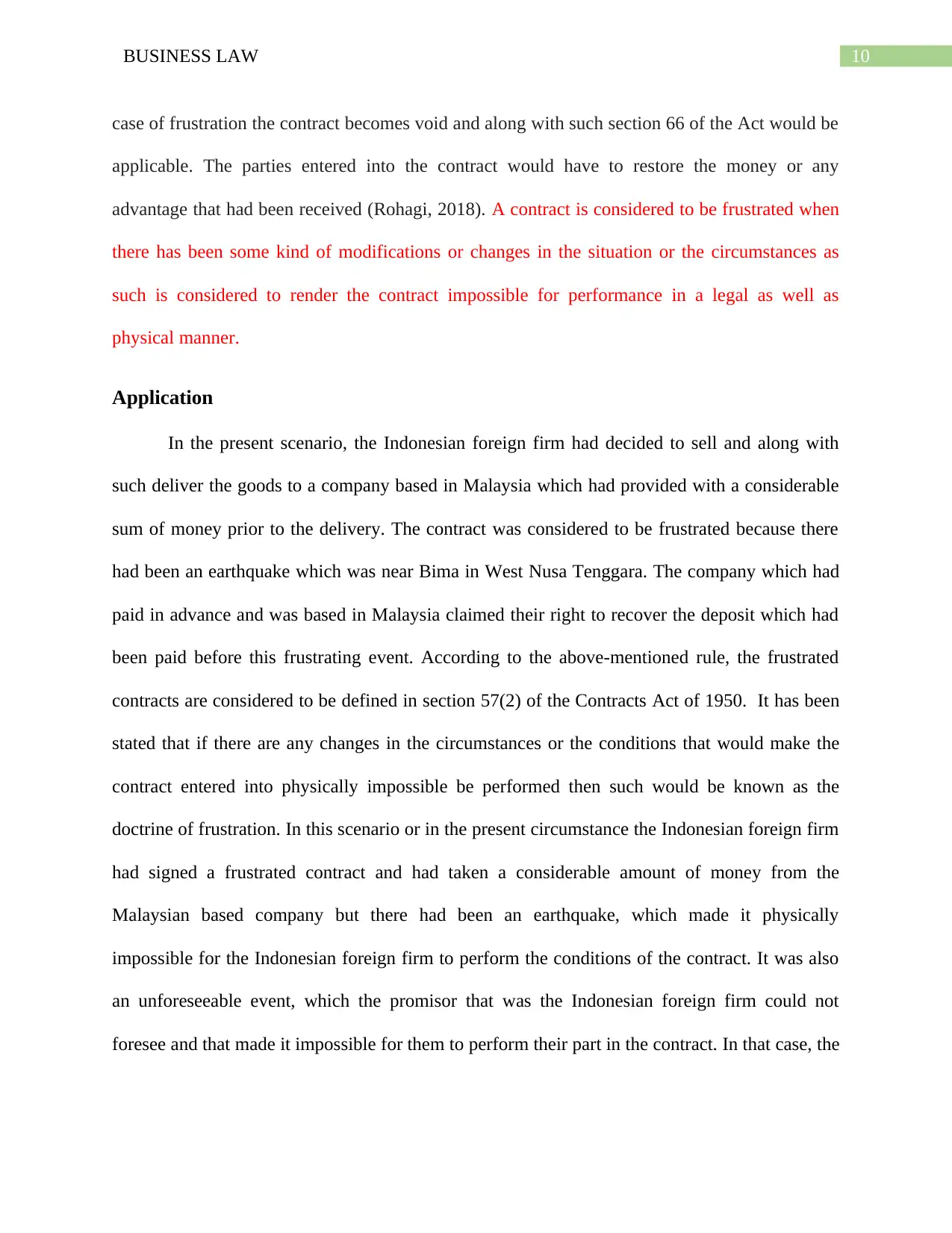
10BUSINESS LAW
case of frustration the contract becomes void and along with such section 66 of the Act would be
applicable. The parties entered into the contract would have to restore the money or any
advantage that had been received (Rohagi, 2018). A contract is considered to be frustrated when
there has been some kind of modifications or changes in the situation or the circumstances as
such is considered to render the contract impossible for performance in a legal as well as
physical manner.
Application
In the present scenario, the Indonesian foreign firm had decided to sell and along with
such deliver the goods to a company based in Malaysia which had provided with a considerable
sum of money prior to the delivery. The contract was considered to be frustrated because there
had been an earthquake which was near Bima in West Nusa Tenggara. The company which had
paid in advance and was based in Malaysia claimed their right to recover the deposit which had
been paid before this frustrating event. According to the above-mentioned rule, the frustrated
contracts are considered to be defined in section 57(2) of the Contracts Act of 1950. It has been
stated that if there are any changes in the circumstances or the conditions that would make the
contract entered into physically impossible be performed then such would be known as the
doctrine of frustration. In this scenario or in the present circumstance the Indonesian foreign firm
had signed a frustrated contract and had taken a considerable amount of money from the
Malaysian based company but there had been an earthquake, which made it physically
impossible for the Indonesian foreign firm to perform the conditions of the contract. It was also
an unforeseeable event, which the promisor that was the Indonesian foreign firm could not
foresee and that made it impossible for them to perform their part in the contract. In that case, the
case of frustration the contract becomes void and along with such section 66 of the Act would be
applicable. The parties entered into the contract would have to restore the money or any
advantage that had been received (Rohagi, 2018). A contract is considered to be frustrated when
there has been some kind of modifications or changes in the situation or the circumstances as
such is considered to render the contract impossible for performance in a legal as well as
physical manner.
Application
In the present scenario, the Indonesian foreign firm had decided to sell and along with
such deliver the goods to a company based in Malaysia which had provided with a considerable
sum of money prior to the delivery. The contract was considered to be frustrated because there
had been an earthquake which was near Bima in West Nusa Tenggara. The company which had
paid in advance and was based in Malaysia claimed their right to recover the deposit which had
been paid before this frustrating event. According to the above-mentioned rule, the frustrated
contracts are considered to be defined in section 57(2) of the Contracts Act of 1950. It has been
stated that if there are any changes in the circumstances or the conditions that would make the
contract entered into physically impossible be performed then such would be known as the
doctrine of frustration. In this scenario or in the present circumstance the Indonesian foreign firm
had signed a frustrated contract and had taken a considerable amount of money from the
Malaysian based company but there had been an earthquake, which made it physically
impossible for the Indonesian foreign firm to perform the conditions of the contract. It was also
an unforeseeable event, which the promisor that was the Indonesian foreign firm could not
foresee and that made it impossible for them to perform their part in the contract. In that case, the
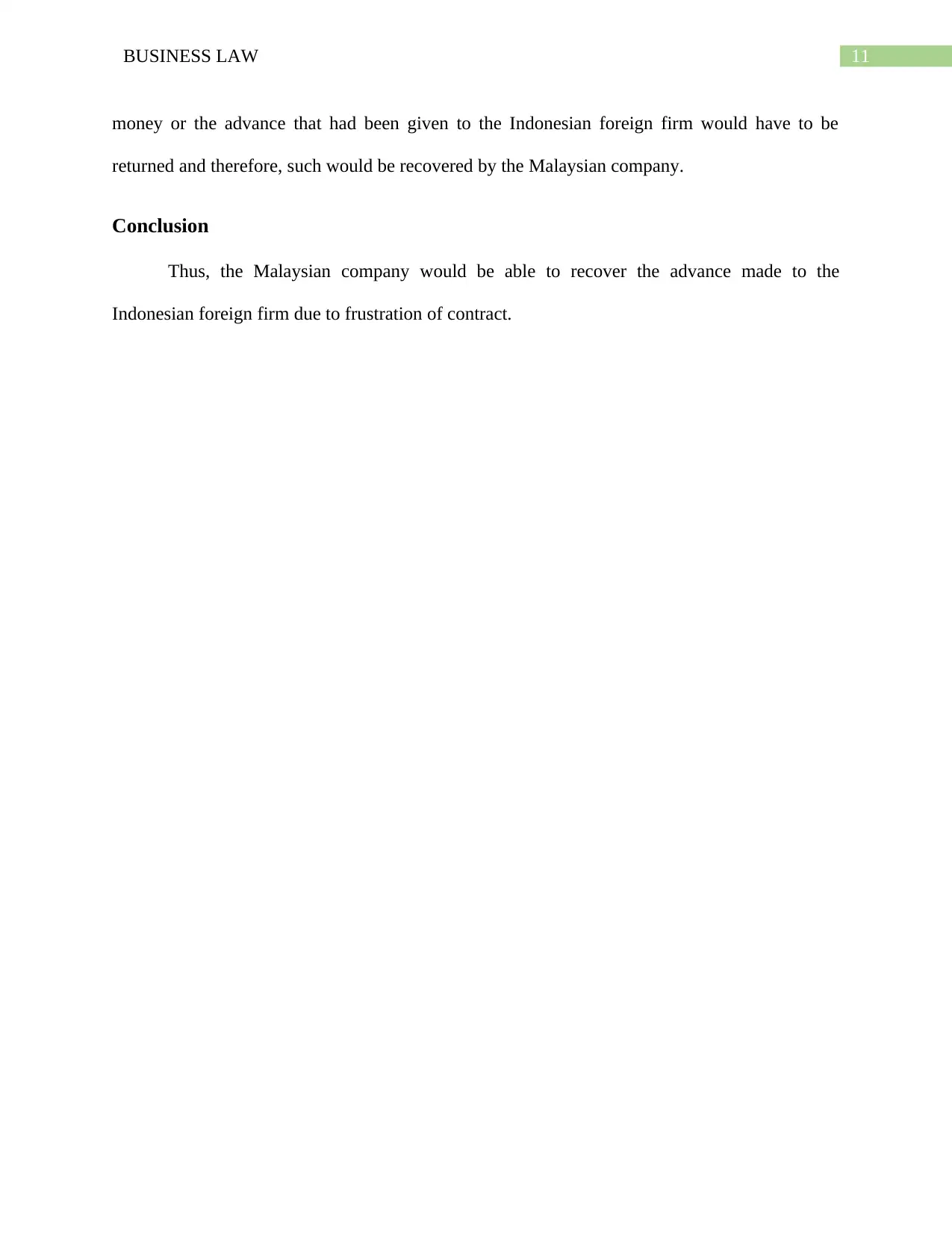
11BUSINESS LAW
money or the advance that had been given to the Indonesian foreign firm would have to be
returned and therefore, such would be recovered by the Malaysian company.
Conclusion
Thus, the Malaysian company would be able to recover the advance made to the
Indonesian foreign firm due to frustration of contract.
money or the advance that had been given to the Indonesian foreign firm would have to be
returned and therefore, such would be recovered by the Malaysian company.
Conclusion
Thus, the Malaysian company would be able to recover the advance made to the
Indonesian foreign firm due to frustration of contract.
⊘ This is a preview!⊘
Do you want full access?
Subscribe today to unlock all pages.

Trusted by 1+ million students worldwide
1 out of 14
Related Documents
Your All-in-One AI-Powered Toolkit for Academic Success.
+13062052269
info@desklib.com
Available 24*7 on WhatsApp / Email
![[object Object]](/_next/static/media/star-bottom.7253800d.svg)
Unlock your academic potential
Copyright © 2020–2026 A2Z Services. All Rights Reserved. Developed and managed by ZUCOL.




